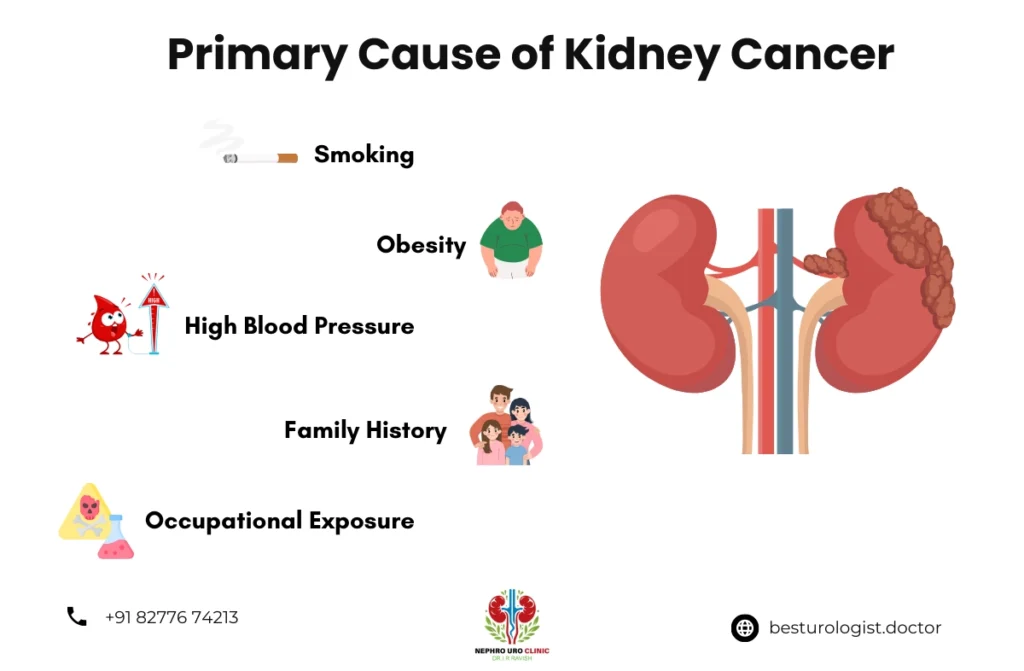Treatment of kidney cancer has advanced significantly in recent years, offering patients more hope than ever before. With early diagnosis and the right approach, recovery chances increase significantly. The Best Urologist will always recommend a treatment plan based on the cancer stage, overall health, and personal circumstances. Understanding treatment of kidney cancer, its signs, and available treatments can help patients and their families make informed decisions. In this blog, we will explore everything about the treatment of kidney cancer, including traditional methods, innovative approaches, and non-surgical treatments.
What is Kidney Cancer?
Kidney cancer starts when abnormal cells grow uncontrollably in the kidneys. The most common type is renal cell carcinoma (RCC), which accounts for about 90% of kidney cancers. Other types include transitional cell carcinoma and Wilms tumor, which mainly affects children. Early detection is key to effective kidney cancer treatment, making it essential to be aware of symptoms and risk factors.

Treatment Overview
The treatment of kidney cancer depends on various factors, including tumor size, location, stage, and patient health. Recent medical advancements now offer multiple options beyond traditional surgery, which has increased the kidney cancer treatment success rate.
Common treatment strategies include:
- Surgery (partial or radical nephrectomy)
- Cryotherapy
- Radiofrequency or microwave ablation
- Renal arterial embolisation
- Targeted therapy or immunotherapy
- Radiotherapy
Many patients inquire about treating kidney cancer without surgery, especially if they are elderly or have other health conditions. Minimally invasive treatments and drug therapies are now viable alternatives in early or advanced stages. Personalized care plans improve outcomes and minimize side effects.
The approach your doctor recommends will depend on the cancer’s behavior and your overall health. Thanks to medical innovation, kidney cancer can often be managed effectively, leading to a significantly improved kidney cancer treatment success rate in both early and advanced stages.
Surgery
Surgery remains a primary form of the treatment of kidney cancer, especially in early-stage tumors. It involves removing all or part of the affected kidney to eliminate the tumor and prevent further spread.
Surgical Options:
- Radical nephrectomy: Entire kidney is removed, often with nearby lymph nodes and adrenal gland.
- Partial nephrectomy: Only the tumor and a small margin of healthy tissue are removed, preserving kidney function.
These surgeries can be performed using:
- Traditional open methods
- Minimally invasive laparoscopic or robotic-assisted techniques
Surgical success is high in localized tumors, greatly contributing to the kidney cancer treatment success rate. However, not every patient is suitable for surgery due to age or co-existing medical conditions. In such cases, doctors explore treating kidney cancer without surgery using non-invasive alternatives.
Post-surgical recovery depends on the technique used, but most patients return to normal activities within a few weeks with improved long-term outcomes.
Cryotherapy
Cryotherapy is a minimally invasive procedure used in the treatment of kidney cancer, especially for patients unfit for surgery. It involves freezing cancer cells using a special probe inserted directly into the tumor.
Key Benefits of Cryotherapy:
- Minimally invasive with shorter recovery time
- Effective for small tumors (usually <4 cm)
- Preserves surrounding kidney tissue
- Low complication rate
This method is ideal for treating kidney cancer without surgery, particularly in older patients or those with additional health risks. It’s often performed under CT or ultrasound guidance and requires only a brief hospital stay.
While long-term data is still emerging, cryotherapy offers promising outcomes and contributes positively to the kidney cancer treatment success rate, particularly in patients who are not surgical candidates. It may be repeated if new growth is detected, offering flexibility in ongoing cancer management with reduced physical stress on the patient.
Microwave or Radiofrequency Ablation
Microwave ablation and radiofrequency ablation (RFA) are cutting-edge treatments in the treatment of kidney cancer, especially for tumors smaller than 4 cm. These techniques use heat generated by electrical or microwave energy to destroy cancer cells.
Advantages of Ablation Techniques:
- Outpatient or short-stay procedure
- Local anesthesia or mild sedation
- Minimal scarring and tissue damage
- Short recovery time
These methods are increasingly used for treating kidney cancer without surgery, offering excellent results in carefully selected patients. Ablation is guided by real-time imaging, ensuring accurate targeting of the tumor while preserving healthy tissue.
Although not considered curative in all cases, ablation can effectively control local tumor growth and reduce symptoms. It contributes to the rising kidney cancer treatment success rate, especially for those who cannot undergo surgery. With technological advancements, ablation techniques are becoming more precise and accessible, enhancing patient care outcomes.
Blocking the Blood Supply (Renal Arterial Embolisation)
Renal arterial embolisation is a specialized technique used in the treatment of kidney cancer, particularly when surgery is not an option. It involves inserting a catheter through the groin to deliver tiny particles into the kidney’s blood vessels, effectively blocking the tumor’s blood supply.
Benefits of Arterial Embolisation:
- Shrinks the tumor by starving it of oxygen
- Reduces bleeding risk before surgery
- Helps control symptoms like pain and hematuria
- Suitable for advanced or inoperable cases
This technique is beneficial for treating kidney cancer without surgery, especially in patients with significant medical risks or widespread disease. Although it may not cure cancer, it plays a valuable role in improving quality of life and managing tumor progression.
By reducing tumor size and symptoms, embolisation complements other treatments like immunotherapy. It supports the overall kidney cancer treatment success rate when integrated into a comprehensive, multidisciplinary cancer care plan.
Targeted or Immunotherapy Cancer Drugs
Targeted therapy and immunotherapy have transformed the landscape of the treatment of kidney cancer, offering powerful options for advanced or metastatic cases. These drugs interfere with cancer growth or boost the immune system’s ability to attack cancer cells.
Key Drug Types:
- Targeted therapy (e.g., sunitinib, pazopanib): Blocks proteins that fuel cancer growth.
- Immunotherapy (e.g., nivolumab, pembrolizumab): Activates the body’s immune system.
These therapies are often used for treating kidney cancer without surgery, especially when the disease has spread beyond the kidney. They are typically administered orally or via IV, depending on the regimen.
The integration of these therapies has notably improved the kidney cancer treatment success rate, providing longer survival times and better symptom control. Side effects are generally manageable, and treatments can be tailored based on individual genetic markers, further enhancing their effectiveness and patient experience.
Radiotherapy
Radiotherapy is generally not the primary approach in the treatment of kidney cancer but plays a critical role in palliative care. It uses high-energy radiation to shrink tumors and relieve symptoms caused by metastatic spread, especially to bones or the brain.
Uses of Radiotherapy in Kidney Cancer:
- Alleviates pain from bone metastases
- Controls bleeding or obstruction
- Targets residual tumor post-surgery
- Complements immunotherapy in some cases
While radiation isn’t curative for primary kidney tumors, it provides significant benefits in treating kidney cancer without surgery, especially for patients with inoperable conditions. Modern techniques like stereotactic body radiotherapy (SBRT) deliver precise doses with minimal side effects.
By improving comfort and slowing tumor growth in specific locations, radiotherapy contributes to the comprehensive care model and enhances the overall kidney cancer treatment success rate when used alongside other therapies. It’s a valuable option in managing advanced or symptomatic cancer.
What Are the Signs of Kidney Cancer?
Detecting kidney cancer early can improve treatment success. Common symptoms include:
- Blood in the urine (hematuria), appearing pink, red, or brown.
- Persistent back pain that doesn’t go away.
- Unexplained weight loss and loss of appetite.
- Fatigue and prolonged fever.
- A lump or swelling in the side or lower back.
These symptoms may indicate other health issues, but it’s crucial to consult a doctor for a proper diagnosis.
What is the Primary Cause of Kidney Cancer?
The exact cause of kidney cancer remains unclear, but certain factors increase the risk:
- Smoking: Increases kidney cancer risk by up to 50%.
- Obesity: Excess weight affects hormone levels that may contribute to cancer.
- High Blood Pressure: Linked to higher cancer risk, possibly due to kidney damage.
- Family History: Having close relatives with kidney cancer raises the likelihood.
- Occupational Exposure: Contact with harmful chemicals like cadmium can increase risk.
Reducing these risk factors can help prevent kidney cancer or detect it early, allowing for better kidney cancer treatment options.
How is Kidney Cancer Diagnosed?
To confirm kidney cancer, doctors use multiple diagnostic methods:
- Blood and Urine Tests: Identify abnormalities that suggest kidney issues.
- Imaging Tests: CT scans, MRIs, and ultrasounds help detect tumors.
- Biopsy: A small tissue sample is taken to confirm cancer presence.
Early diagnosis significantly improves kidney cancer treatment outcomes, making regular check-ups essential.
What are the Kidney Cancer Stages?
Doctors classify kidney cancer into four stages:
- Stage 1: Tumor is small (less than 7 cm) and confined to the kidney.
- Stage 2: Tumor is larger but hasn’t spread outside the kidney.
- Stage 3: Cancer has spread to nearby lymph nodes or blood vessels.
- Stage 4: Cancer has spread to distant organs like the lungs, liver, or bones.
Each stage affects the treatment approach, with early stages often treated with surgery and later stages requiring more advanced therapies. Treating kidney cancer without surgery is an option for certain stages, depending on individual cases.
How is Kidney Cancer Treated?
Treatment of kidney cancer depends on its stage and the overall health of the patient. Main treatment methods include:
- Surgery: The most effective method for early-stage cancer. It includes partial nephrectomy (removing only the tumor) and radical nephrectomy (removing the entire kidney).
- Targeted Therapy: Helps shrink tumors in advanced kidney cancer.
- Immunotherapy: Enhances the body’s defense against cancer.
- Radiation Therapy: Often used for pain relief in advanced stages.
- Chemotherapy: Less common but used in aggressive cancer cases.
A combination of these methods ensures the best possible outcome for the treatment of kidney cancer. Treating kidney cancer without surgery is an alternative for certain patients who may not be candidates for surgical intervention.
Traditional Approaches to Kidney Cancer Treatment
Traditional kidney cancer treatment methods focus on removing cancerous cells while minimizing damage to healthy tissues. These include:
- Surgical Removal: The primary method for localized kidney cancer.
- Radiation Therapy: Targets cancer cells with high-energy beams.
- Hormone Therapy: Helps slow cancer growth in rare cases.
- Chemotherapy: Used when kidney cancer spreads to other organs.
Though effective, these methods may cause side effects like fatigue, nausea, and immune system suppression.
Treating Kidney Cancer Without Surgery
Many patients wonder if treating kidney cancer without surgery is possible. Fortunately, new treatment options make non-surgical approaches more effective. These include:
- Cryoablation: Freezes cancer cells to prevent growth.
- Radiofrequency Ablation: Uses heat to destroy tumors.
- Targeted Drug Therapy: Blocks signals that help cancer grow.
- Immunotherapy: Boosts the body’s immune system to fight cancer.
Treating kidney cancer without surgery is beneficial for patients who cannot undergo surgery due to health conditions.
Emerging Non-Surgical Kidney Cancer Treatments
Advancements in medical science have led to new ways of treating kidney cancer without surgery. Some promising options include:
- High-Intensity Focused Ultrasound (HIFU): Destroys cancer cells with ultrasound waves.
- Nanoparticle Drug Delivery: Directly targets cancer cells, reducing side effects.
- Gene Therapy: Alters genes to stop cancer growth.
- Artificial Intelligence in Treatment Planning: AI helps doctors develop personalized treatment plans.
These methods continue to evolve, offering more hope for patients seeking alternative treatments. With continuous research, 6 Innovative Kidney Cancer Treatment Options are emerging to provide better and less invasive treatments.
Conclusion
Treatment of kidney cancer has improved with modern medical advancements, giving patients multiple options for recovery. The Best Urologist will recommend the best approach depending on the cancer stage and overall health. From traditional surgical methods to emerging non-surgical treatments, there is hope for all kidney cancer patients.
Read also How to Know About Prostate Cancer.




